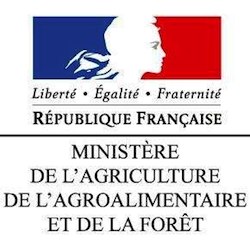
MINISTÈRE DE L’AGRICULTURE, DE L’AGROALIMENTAIRE ET DE LA FORET
(FRENCH MINISTRTY OF AGRICULTURE, AGRIFOOD AND FORESTRY)
ANIMAL HEALTH CONDITIONS FOR TRAVELLING WITH PETS TO A COUNTRY OF THE EUROPEAN UNION AS FROM 29th December 2014 (non-commercial transport)
Pets are defined as animals belonging to the following species: dogs, cats, ferrets, pet rodents and rabbits, birds (all species except those classed as poultry*), reptiles, amphibians, ornamental tropical fish, and invertebrates – except bees and crustaceans –, accompanying their owners or a designated person who assumes responsibility on behalf of the owner during their transport and which are not intended to be subject to a sale or a transfer of ownership.
*Poultry as defined within the meaning of EC Regulation 90/539 relates to: chickens, turkeys, guinea fowl, duck, geese, quail, pigeons, pheasants, partridges, as well as flightless birds (ratites).
A – Travelling with cats / dogs / ferrets within the European Union
The animal must have, in accordance with the order listed below:
1 – Identification by means of a microchip (transponder).
(Animals identified by tattoo before 3rd July 2011 may continue to travel within the EU provided that the tattoo is clearly legible).
2 – An anti-rabies vaccination, carried out from a minimum age of 12 weeks, that is currently valid (primary vaccination and subsequent boosters).
3 – A passport issued by a veterinarian who is authorised by the relevant national authority and which certifies the animal’s identity and rabies vaccination.
Passports issued on or after 29th December 2014 must conform to the new style passport (pages containing the animal’s identity, microchip information and rabies vaccination history are protected from tampering by laminated strips).
If you have a passport that was issued before this date you do not need to change it until all the treatment spaces are filled.
B – For travel to Ireland, Malta, the UK and Finland
Dogs must, in addition to the conditions listed under Part A:
- have received treatment against the EM tapeworm (echinococcus multilocularis) within the preceding 120 to 24 hours prior to arrival.
- This treatment must be recorded (date and time) by the veterinarian who administered the treatment in section VII of the EU pet passport.
- Pets can only be imported into Malta and the UK by authorized forms of transport (private planes or boats are not permitted).
C – Travelling with more than 5 dogs, cats and ferrets
For 6 or more dogs, cats and ferrets, further conditions apply to those listed above under Part A (see also Part B):
Commercial conditions apply. It is obligatory to:
- have a veterinarian perform a clinical examination of each animal within the 48 hours preceding the time of departure. This examination must be recorded in section X of each animal’s EU pet passport.
- register the movement under the TRACES system and provide certification of compliance with the health regulations listed above by contacting the relevant governmental department in your country.
- use a vehicle authorised for the transportation of animals.
Exempted from these additional regulations are animals that are travelling in order to participate in a competition, show or sporting event, and then only when the following applies: the animals are all over the age of 6 months and the owner can provide proof of registration for the said event (e.g. name of event / date / location / identification of those animals registered for the event). A signed declaration from the owner may be required to supplement the proof of registration supplied.
Important information
Health checks
The health checks must be performed in the order specified above (identification / vaccination / anti-parasitic treatment) and be recorded in the passport.
Treatment against tapeworm (echinococcus) must be performed within an interval of 120 to 24 hours prior to the arrival of the animals.
In the case of primary rabies vaccination, this is only considered valid after at least 21 days have elapsed.
Some EU Member States have opted to conditionally accept entry into their territory of animals outwith the regulations stated above, i.e. animals younger than 12 weeks old, animals without rabies vaccinations or animals with vaccinations but without having reached the legal minimum time limit for antibodies to be present. It is the responsibility of the owner to verify the relevant conditions in each EU Member State.
France has not agreed to this option.
Identification
If pets are identified by microchip, the owner or the designated person who assumes the responsibility for the pet must ensure the readability of the transponder (microchip).
IMPORTANT: since 3rd July 2011, only microchips have been recognised as a means of identification for travel within the European Union, except for animals identified by tattoo (clearly legible) before that date.
Penalties applicable in the case of non-compliance with the mandatory regulations.
When the aforementioned health conditions are not complied with, officers responsible for performing checks can require, at the expense of the owner, the repatriation of the animal to its country of origin, a quarantine period, or the extermination of the animal.
For more detailed information, pet owners can visit the websites of the following countries
Ireland: http://www.agriculture.gov.ie/pets/
Finland: http://www.evira.fi/portal/en/animals/import+and+export/eu-member-countries–norway-and-switzerland/dogs–cats-and-ferrets/
UK: https://www.gov.uk/government/uploads/system/uploads/attachment_data
/file/390396/pet-travel-scheme-dec-2014-guidance.pdf
Malta: http://www.vafd.gov.mt/pet-travel-scheme?l=1
They can also visit the websites of the European Commission and the French Ministry:
• http://ec.europa.eu/food/animal/liveanimals/pets/nocomm_intra_en.htm
• http://www.agriculture.gouv.fr/animaux-de-compagnie
D – Other pet animals
• Pet rodents or rabbits
• Aviary birds
• Reptiles
• Amphibians
To travel to another EU Member State, it is advisable to enquire at the embassy of the country concerned in order to determine the necessary requirements.
Furthermore, the animals must not, in any way whatsoever, be destined for sale.
